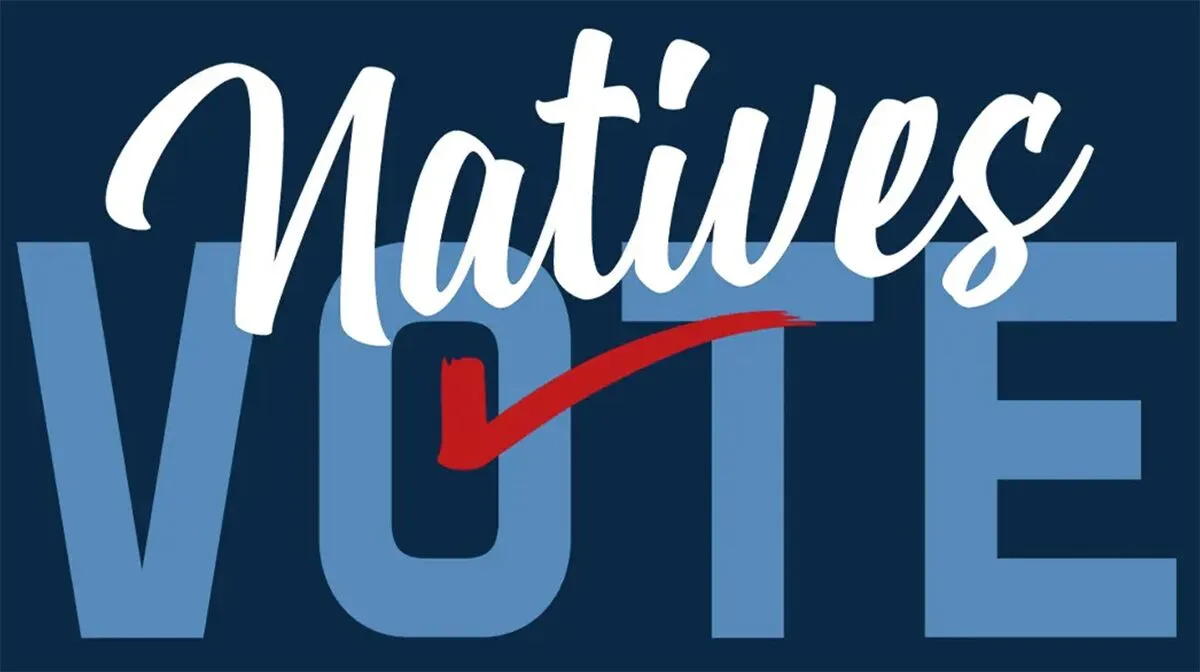
- Details
- By Native News Online Staff
Native Vote 2024. Ahead of the upcoming presidential election, the American Indian College Fund is launching its “Make Native Voice Heard—Vote!” campaign to encourage Native people to register and vote on Tuesday, November 5, 2024.
The American College Indian Fund said in a press release that Native Americans are more impacted by legislation than any other group in the United States. Native students in higher education, or seeking a higher education, in particular, are impacted by federal and state laws allocating funding for education, such as Pell Grants, student loans, and federal funding for tribal colleges and universities (TCUs), 70% of which comes from federal sources.
Beyond educational issues, the College Fund says voting gives Indigenous communities representation within laws and policies that guide Native nations, including housing, health care, early childhood education, energy programs, and reservation infrastructure.
As other critical issues, such as the high rate of Missing and Murdered Indigenous Women, environmental protections, and economic development hang in the balance, Native voices need to be heard at every level of government.
The College Fund President and CEO Cheryl Crazy Bull says Native people have been historically deterred from exercising their right to vote and have had to litigate that right to be heard.
“Only in 1958, 38 years after the Indian Citizenship Act, did Native voters participate in elections in all 50 states. By voting in tribal, local, state, and national elections, Native people exercise their legal right to vote and honor the ancestors that fought for it, while ensuring we have a say in our futures as Native people and sovereign Nations,” Crazy Bull said.
In an effort to make it easier for Native college students to have their voices heard at the polls, the College Fund’s Make Native Voices Heard web page shares information on how to register to vote in every state at https://collegefund.org/vote/register/.
As part of the campaign, the College Fund will also share information about how to make a voting plan and many ways voting impacts Native communities. Native students, tribal college presidents, faculty, and staff and others are also invited to share their reasons for voting and voting plans in blogs and videos at https://collegefund.org/vote/.
The College Fund is also offering $500 awards to TCU students who are leading voter education events.
For more information on how to submit a blog or video, grants for voter education events, and to follow the campaign, visit https://collegefund.org/vote/ or follow the College Fund on Facebook at American Indian College Fund and Native Pathways.
The campaign will run from now through early November.
More Stories Like This
Navajo Nation Signs $19 Million Diné Higher Education Grant Fund Act into LawDr. Shelly C. Lowe to Be Inaugurated as IAIA President March 26–27
Tlingit Language Courses Expand for Students to Learn With Families At-Home
American Education Has Failed Its First People, But Hope Is On The Horizon
Bipartisan Vote Keeps Institute of American Indian Arts Alive and Funded
Help us defend tribal sovereignty.
At Native News Online, our mission is rooted in telling the stories that strengthen sovereignty and uplift Indigenous voices — not just at year’s end, but every single day.
Because of your generosity last year, we were able to keep our reporters on the ground in tribal communities, at national gatherings and in the halls of Congress — covering the issues that matter most to Indian Country: sovereignty, culture, education, health and economic opportunity.
That support sustained us through a tough year in 2025. Now, as we look to the year ahead, we need your help right now to ensure warrior journalism remains strong — reporting that defends tribal sovereignty, amplifies Native truth, and holds power accountable.
 The stakes couldn't be higher. Your support keeps Native voices heard, Native stories told and Native sovereignty defended.
The stakes couldn't be higher. Your support keeps Native voices heard, Native stories told and Native sovereignty defended.
Stand with Warrior Journalism today.
Levi Rickert (Potawatomi), Editor & Publisher


